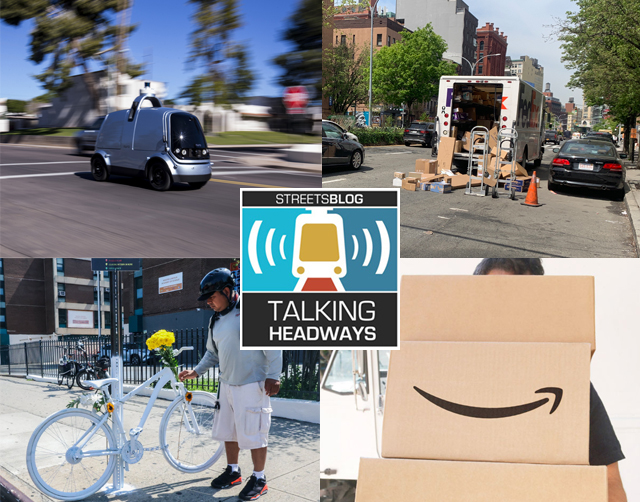This week, Amanda Howell at The University of Oregon's Urbanism Next talks about its study with the Knight Autonomous Vehicle Initiative on sidewalk delivery robots. Here's the skinny on community engagement and small delivery vehicles on city sidewalks.
For those of you who prefer to read rather than listen, check out the edited highlights below the player. If you want a full, unedited transcript, be our guest by clicking here.
Jeff Wood: It seems like it can hold a sandwich or maybe an individual meal, right? Like that’s the size [of the sidewalk robot].
Amanda Howell: Yeah, it’s pretty small. That’s right. It depends on what you’re ordering. You could probably have a couple of sandwiches delivered, maybe two tall lattes. Its capacity is pretty limited.
Wood: What does that mean for the companies that the pilot was trying to partner with? Were they like, "Yeah sure we, we want to deliver sandwiches in these vehicles, or Mexican food, or whatever it might be. What were the feelings like from the folks that you were trying to partner with in order to do some real-world testing?
Howell: That is a great question and definitely one of the biggest challenges that we came across over the course of the pilot. So Kiwibot approached a lot of local stores and restaurants in these four cities. People were interested; folks were like, "Oh yeah, this like, it’d be interesting to try this technology." But at the end of the day, from the standpoint of rubber meeting the road, how does this actually work? There were quite a lot of challenges in trying to figure out how this would integrate into a business, especially with what everyone was dealing with at the time, like limited staff, Covid protocols and all kinds of stuff. There was already so much going on.
On top of that, some of these places did end up working with a taco truck in Pittsburgh, but that truck didn’t have an online menu to begin with. So Kiwibot ended up having to help digitize the menu and then help create an ordering platform, things that didn’t even exist before. That, I think, was the most extreme version of some of these challenges in trying to integrate with these businesses [and] made it pretty difficult. Inventory management is another thing, if businesses aren’t necessarily used to doing a lot of online orders. I think everyone was figuring this out during the pandemic and scaling up and doing a lot more of it.
But, you know, even some places were like, "Yeah, that seems cool, but like that really isn’t where my business is. You know, people call and they place an order and they come get it. I don’t know that there’s gonna be the demand for it from my customer base." So, you know, there were quite a lot of challenges in that regard in terms of onboarding, especially the small and local businesses, which is one of the things that we had really wanted to try — to see like what is it like to try and work with these smaller local businesses. Could this be, from an economic development standpoint, ... beneficial? I think the challenges of onboarding and then moving forward for the folks who did actually end up using it, it’s like, "it was a fun novelty, but it’s going four miles an hour."
That’s pretty slow. So a lot of places were like, "we’re already using these other delivery services and that’s working fine." Maybe it’s imperfect, but this is what we’ve got.






